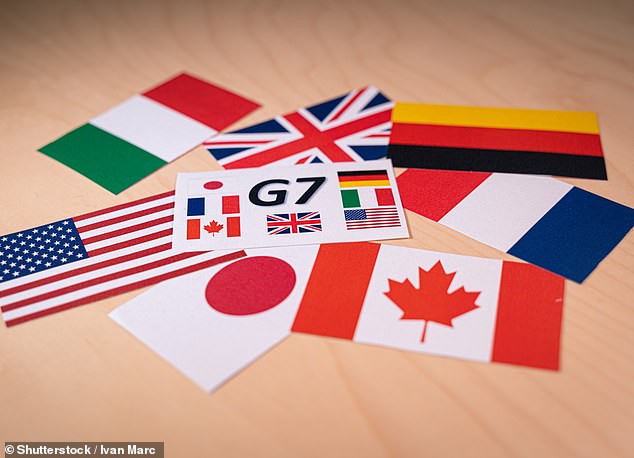[ad_1]
Rachel Reeves likes to brag that Britain is the fastest-growing economy in the G7 – a ‘beacon of stability’ in an uncertain world.
She will soon have to change her tune. Yes, the economy grew by 0.7 per cent in the first quarter, leaving the US, Germany, France and the rest of the G7 in Britain’s wake.
But it is never wise to dine out on one set of figures, and GDP contracted by 0.3 per cent in April and 0.1 per cent in May, leaving the second quarter looking somewhat iffy to say the least. Britain could soon be at, or close to, the bottom of the G7 pile.
What will the Chancellor say then?
The harsh reality, as opposed to Reeves’ rose-tinted rhetoric, is seen in the latest jobs figures, which make grim reading.
Unemployment is now at a four-year high of 4.7 per cent and 178,000 jobs have been lost since the election, according to the Office for National Statistics.

‘Beacon of stability’: Rachel Reeves likes to brag that Britain is the fastest-growing economy in the G7
As Britain loses its fastest-growing-in-the-G7 crown, we continue to ‘lead’ the pack in ways the Chancellor is less keen to talk about.
At 3.6 per cent, we now have the highest rate of inflation among the group.
This muddies the waters for the Bank of England and the outlook for interest rates – though another cut remains likely next month.
While Reeves seeks credit for four rate cuts on her watch, which she sees as a by-product of the ‘stability’ she has fostered, borrowing costs may have in fact fallen further and faster but for her own policies. The £25billion rise in National Insurance Contributions (NICs) that are paid by employers has pushed up prices and hit employment. As has the rise in the minimum wage.
Throw in Labour’s jobs-destroying workers’ rights package, and the menace of stagflation looms large.
A pattern is developing. When in Opposition, Reeves described NICs as a ‘jobs tax’ but, when in office, raised it anyway.
At the Mansion House last week she warned that ‘regulation acts as a boot on the neck of businesses’.
Yet a fresh wave of red tape is coming. And she was right when she said this spring that ‘we can’t tax and spend our way to higher living standards and better public services’.
But that is exactly the policy that she is pursuing, with more tax hikes and spending to come.
So while she and her minions in the Treasury boast of ‘stability’, the country faces a summer of speculation over which taxes will rise and who will be hit.
‘Working people’ – the legions Labour vowed to protect – is the answer whether they be ‘wealthy’ or on ‘modest incomes’.
The damage to the economy and livelihoods will be stark.
But perhaps most worrying of all is our standing on the bond markets.
Bond yields, which are a measure of what investors charge a country to lend it money, are higher here than in any other G7 country.
That’s right, it costs the British Government more to borrow than the US, Canada, Germany, France, Italy and Japan.
It even costs Britain more to borrow than Greece.
According to the Office for Budget Responsibility: ‘The UK Government faces the third-highest borrowing costs of any advanced economy after New Zealand and Iceland.’
Far from being a ‘beacon of stability’, we are at the mercy of the bond markets, which are not keen on what they see.
Britain’s economy does stand apart from other members of the G7 under Labour. But not in the ways that the Chancellor would like.
DIY INVESTING PLATFORMS

AJ Bell

AJ Bell
Easy investing and ready-made portfolios

Hargreaves Lansdown

Hargreaves Lansdown
Free fund dealing and investment ideas

interactive investor

interactive investor
Flat-fee investing from £4.99 per month

InvestEngine

InvestEngine
Account and trading fee-free ETF investing
Trading 212
Trading 212
Free share dealing and no account fee
Affiliate links: If you take out a product This is Money may earn a commission. These deals are chosen by our editorial team, as we think they are worth highlighting. This does not affect our editorial independence.
[ad_2]
This article was originally published by a www.dailymail.co.uk . Read the Original article here. .

